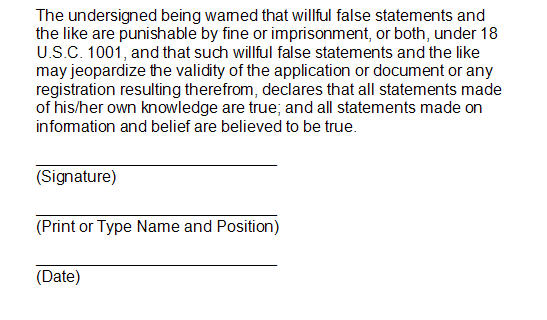804.01(b) Declaration in Lieu of Oath
Under 35 U.S.C. §25, the USPTO is authorized to accept a declaration under 37 C.F.R. §2.20 or 28 U.S.C. §1746 instead of an oath. These declarations can be used whenever the Act or rules require that a document be verified or under oath.
When the language of 37 C.F.R. §2.20 or 28 U.S.C. §1746 is used with a document, the document is said to have been subscribed to (signed) by a written declaration rather than verified by oath (jurat).
When a declaration is used in lieu of an oath, the party must include in place of the oath (jurat) the statement that "all statements made of his or her own knowledge are true and all statements made on information and belief are believed to be true." The language should be placed at the end of the document.
In addition, the declaration must warn the declarant that willful false statements and the like are punishable by fine or imprisonment, or both (18 U.S.C. §1001). 35 U.S.C. §25(b). Trademark Rule 2.20 requires that the warning contain the additional language that such statements may jeopardize the validity of the application (or document) or any registration resulting therefrom. A declaration under 37 C.F.R. §2.20 should read as follows:

Instead of using the language of 37 C.F.R. §2.20, an applicant may use the language of 28 U.S.C. §1746, which provides as follows:
Wherever, under any law of the United States or under any rule, regulation, order, or requirement made pursuant to law, any matter is required or permitted to be supported, evidenced, established, or proved by the sworn declaration, verification, certificate, statement, oath, or affidavit, in writing of the person making the same (other than a deposition, or an oath of office, or an oath required to be taken before a specified official other than a notary public), such matter may, with like force and effect, be supported, evidenced, established, or proved by the unsworn declaration, certificate, verification, or statement, in writing of such person which is subscribed by him, as true under penalty of perjury, and dated, in substantially the following form:
- 1 If executed outside the United States, its territories, possessions, or commonwealths: "I declare (or certify, verify, or state) under penalty of perjury under the laws of the United States of America that the foregoing is true and correct. Executed on (date).
(Signature)".
- 2 If executed within the United States, its territories, possessions, or commonwealths: "I declare (or certify, verify, or state) under penalty of perjury that the foregoing is true and correct. Executed on (date).
(Signature)".
NOTE: A declaration under Title 35 of the United States Code, which pertains specifically to the USPTO, is preferred to one under 28 U.S.C. §1746, which is a statute of general application relating to verification on penalty of perjury.
A declaration that does not attest to an awareness of the penalty for perjury is unacceptable. See 35 U.S.C. §25; In re Hoffmann-La Roche Inc., 25 USPQ2d 1539, 1540-41 (Comm’r Pats. 1992) (failure to include a statement attesting to an awareness of the penalty for perjury, which is the very essence of an oath, is not a "minor defect" that can be provisionally accepted under 35 U.S.C. §26), overruled on other grounds, In re Moisture Jamzz Inc., 47 USPQ2d 1762, 1764 (Comm’r Pats. 1997); In re Stromsholmens Mekaniska Verkstad AB, 228 USPQ 968, 970 (TTAB 1986); In re Labs. Goupil, S.A., 197 USPQ 689, 689-90 (Comm’r Pats. 1977).
The signatory must personally sign his or her name. It is unacceptable for a person to sign another person’s name to a declaration pursuant to a general power of attorney. See In re Dermahose Inc., 82 USPQ2d 1793, 1796-97 (TTAB 2007); In re Cowan, 18 USPQ2d 1407, 1409 (Comm’r Pats. 1990). If a TEAS submission is signed electronically, the person(s) identified as the signer(s) must personally enter the elements of the electronic signature. 37 C.F.R. §2.193(c). In re Dermahose, 82 USPQ2d at 1795-97. See TMEP §611.01(c) regarding signature of documents filed through TEAS.
If a declaration under 37 C.F.R. §2.20 or 28 U.S.C. §1746 is not dated, the examining attorney must require the applicant to state the date on which the declaration was signed. This statement does not have to be verified, and may be entered through a Note to the File in the record.
See TMEP §804.02 regarding the essential allegations required to verify an application for registration of a mark.